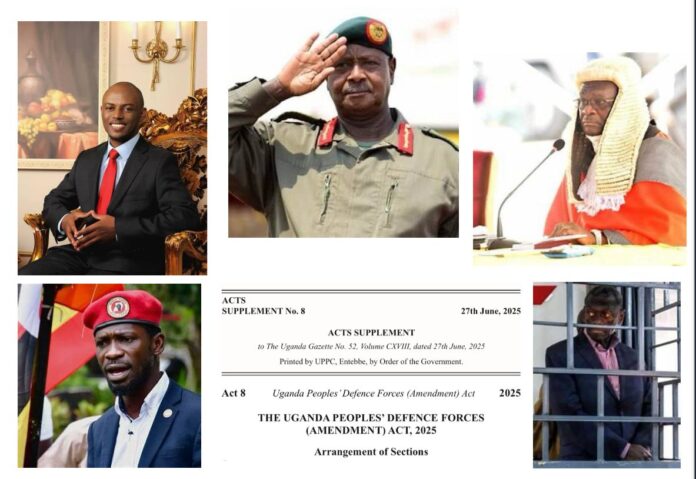In a rare alignment of political forces, two very different petitioners — Dr. Dennis Daniel Ssemugenyi, an independent Ugandan citizen, human rights defender, and public interest litigant, and the National Unity Platform (NUP) led by Robert Kyagulanyi (Bobi Wine) — have separately but decisively moved to the Constitutional Court to challenge the controversial Uganda Peoples’ Defence Forces (Amendment) Act, 2025.
While their filings differ in style, scope, and evidentiary depth, they converge on a single warning: if left to stand, the Act will fundamentally erode civilian rights, judicial independence, and democratic representation ahead of the 2026 General Elections.
Dr. Ssemugenyi’s Petition: A Forensic Constitutional Assault
Filed under multiple constitutional provisions — including Articles 1, 2, 20, 21, 28, 38, 40, 43, 44, 63, 126, and 137 — Dr. Ssemugenyi’s case reads like a comprehensive blueprint for dismantling the law.
Importantly, Dr. Ssemugenyi filed his petition before the Act was even gazetted. He anchors his petition on a powerful constitutional principle: any act or omission by any organ that breaches the Constitution is void ab initio. That means such an act is constitutionally invalid from the moment it occurs, regardless of whether it has been gazetted or operationalized.
• Gazettement is not a condition precedent for constitutional challenge.
• The law need not be operational to be subject to judicial review.
• His petition insists on legality at the outset—and argues that the courts must act before violations accumulate under formal status.
His petition attacks the UPDF Amendment Act on four main fronts:
1. Reinstatement of Military Trials for Civilians
Citing Uganda Law Society v. Attorney General (2006) and Kabaziguruka v. AG (2021), he argues that clauses 29 and 30 unlawfully restore a practice previously deemed unconstitutional.
Violates Articles 28 and 44(c) by denying trial before an independent and impartial civilian court.
2. Criminalization of Civilian Dress and Expression
Targets Schedule 78, which bans civilian possession of military-style attire — such as berets, combat boots, Kaunda suits, black shoes — regardless of insignia.
Infringes freedoms of expression, equality, and lawful trade under Articles 21, 29, and 40.
3. Judicial and Prosecutorial Capture by the Military
The Act establishes a Military Courts Department and grants the CDF a role in appointing acting court heads—undermining civilian judicial independence (Articles 28A, 120, 126, and 128).
4. Gerrymandering and Malapportionment.
Using detailed data from UBOS, the Electoral Commission, and VisiblePolls.
Wakiso District (3.39M residents) has 9 MPs — one MP per 377,507 people.
Kiboga + Ntoroko (296,215 residents combined) have 5 MPs — one MP per 59,243 people—a 6:1 disparity.
He argues this violates equal suffrage and delegitimizes the Parliament, rendering any law it passes—including the UPDF Amendment Act—unconstitutional.
In his rebuttal to the Attorney General and Parliament’s response, Ssemugenyi goes further by citing
Dr. Kizza Besigye’s current incarceration as a “pregnant example” of the dangers embedded in the amended law. He notes that Besigye — a civilian opposition leader — has faced multiple military prosecutions for alleged firearm possession, under the watch of a Chief of Defence Forces who publicly accused him of plotting to kill the President. If enacted, the amendment allows military court chairpersons subject to the CDF chain-of-command to oversee trials of civilians like Besigye, utterly destroying any semblance of impartiality. This isn’t merely about one man — it’s an alarm for any civilian detained under military court martial orders. The fate of prisoners like Besigye illustrates the high-stakes constitutional damage the Act enables.
NUP’s Petition: Political Process and Civil Liberties
Filed shortly after the Act was gazetted, NUP’s petition zeroes in on procedural illegality and civil rights erosion:
1. Procedural Defects in Passing the Bill
o Parliament allegedly gave MPs less than 24 hours to review a 150-page Bill — violating both legislative scrutiny and public consultation norms.
2. Violation of Supreme Court Precedent
o Cites Kabaziguruka v. AG, underscoring that reinstating military trials for civilians directly conflicts with established jurisprudence.
3. Suppression of Civil Liberties Ahead of Elections
o Frames the law as a state tool aimed at intimidating political opponents, journalists, and activists — especially in the fraught pre-election period.
4. Permanent Injunction Sought
o Requests the Constitutional Court to stop civilian trials in military courts and strike out the offending provisions entirely.
Convergence: Two Paths to the Same Battlefield
While Dr. Ssemugenyi’s petition is deeply data-driven and anchored in electoral fairness, NUP’s filing is built for political urgency — staking a claim with both law and mobilization.
Common Ground:
• Both demand the nullification of the Act as unconstitutional.
• Both warn of its role in facilitating military intimidation of civilians ahead of the 2026 elections.
• Both invoke Supreme Court precedent and demand the protection of civilian judiciary.
Key Distinction:
• Dr. Ssemugenyi’s petition challenges Parliament’s legitimacy based on gerrymandering — potentially shaking the entire legal basis on which the Act was enacted.
What’s at Stake Before 2026
If successful, the court could:
• Invalidate key parts or the entirety of the UPDF Amendment Act.
• Reinforce that military courts lack jurisdiction over civilians, cementing civilian judicial authority.
• Trigger necessary boundary reforms, to restore genuine representative democracy.
If they fail, the repercussions may include:
• Continued military trials of civilians, reinforcing a climate of fear.
• Structural electoral inequalities unmoved by reform.
• Further militarization of Uganda’s civilian institutions, with elections undermined by imbalance and repression.
Can They Win?
Both petitions stand on solid constitutional ground, opposing the Act’s derailment of Uganda’s democratic and legal norms. The turning point now lies with the Constitutional Court: will it prioritize legal substance over procedural ceremony — or allow militarization to eclipse constitutional supremacy?



